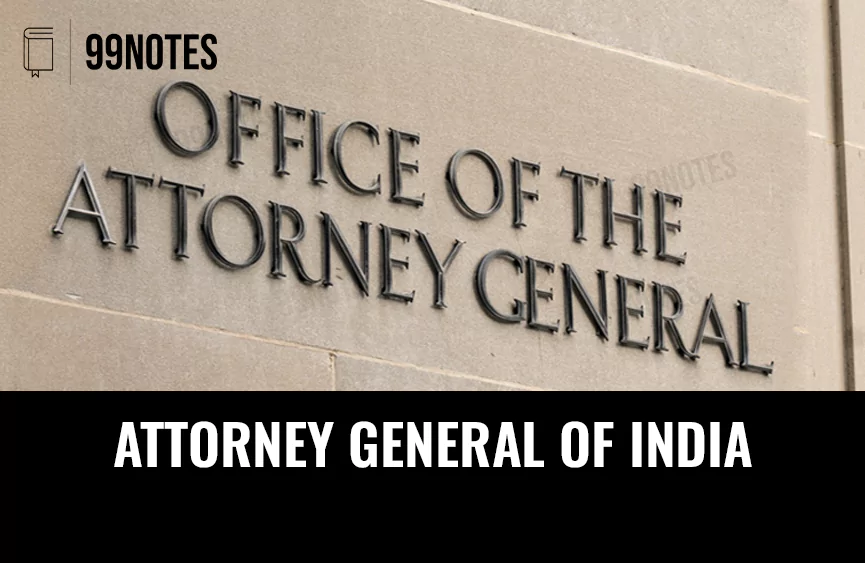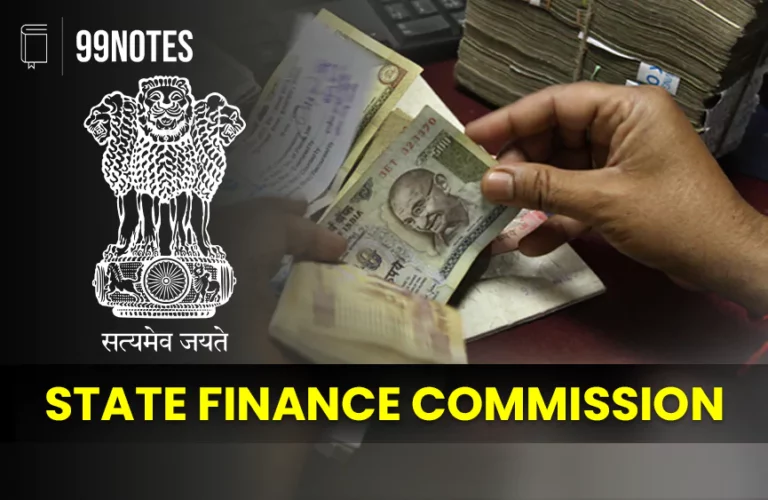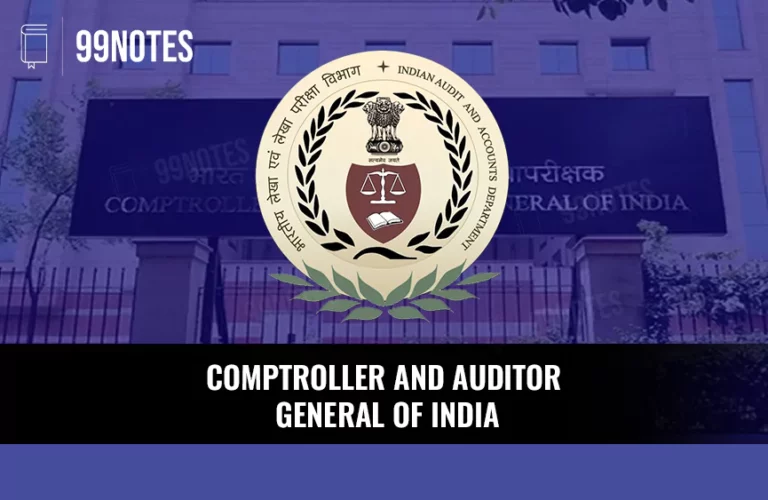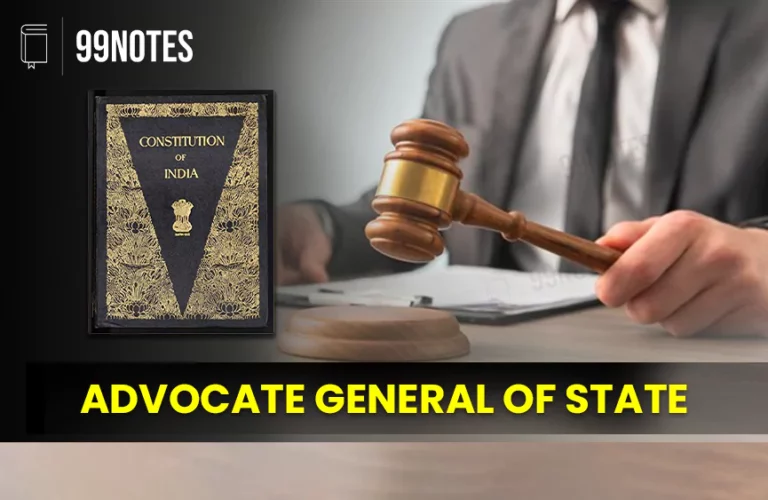Attorney General of India (Article 76)- Indian Polity Notes for UPSC
Attorney General of India
The Attorney General (formerly known as Advocate General) is the highest law officer of the Government of India. The Office of Advocate General is mentioned under Article 76 of the Constitution of India.
Need for the law officer of the Government:
In India’s broader democratic political setup, there is a balance of power between the different organs of the Government. In this aspect, the Government of India, has to be accountable to the judiciary and Parliament. As a consequence, the Government has to be represented in the court to submit its position to the judges in various cases.
Many times, you must have heard that the Government is a major litigant, accounting for nearly 50% of pending cases. Now the question arises: Who shall represent the concern and position of the Government in the judiciary?
It is represented by a team of lawyers consisting of-
- Attorney General of India,
- Solicitor General of India and
- Additional Solicitor General of India.
In this, the Attorney General of India is the highest law officer of the Country. He is an expert in the law and advises the Government on various legal matters.
Appointment and Terms of Office of the Attorney General of India
- Appointment: The Attorney general is appointed by the President of India [Article 76(1)].
- Qualifications: under Article 76(1), the Constitution states that he must possess the same qualifications that are necessary for a judge of the Supreme Court of India, i.e.,
- He must be a citizen of India and
- He must have served as a judge of some high court for at least five years or as an advocate in some High court for not less than ten years or
- Any eminent jurist, in the opinion of the President.
- Term of office: The Attorney General holds office at the pleasure of the President of India. The term of the office is not fixed by the Constitution.
- Conditions and emoluments: The Constitution empowers the President to determine his emoluments and conditions of service.
- Resignation: He can quit his office by tendering his resignation to the President. Generally, he resigns when the council of ministers (Government) resigns or is replaced, as he is appointed on its advice.
- Removal: The procedure and grounds for his removal are not mentioned in the Constitution. Under Article 76(4), he holds the office at the pleasure of the President, i.e., the President can remove him from his office at any specific time.
- Remunerations: The Constitution authorizes the President to fix such remuneration as the President may determine from time to time. The remuneration of the Attorney-General is not fixed by the Constitution.
- Composition: The Attorney General is assisted by a solicitor-general and two Additional Solicitors-general.
- The first Attorney General of India was Motilal Chimanlal Setalvad. He was also chairman of the first Law Commission of India.
Thus, the attorney general along with the solicitor general can be appointed and removed by the government at will. This is because, the government is allowed to defend itself with the set of lawyers that best suits its interest.
Duties and Functions of Attorney General of India:
The attorney general is the principal adviser to the Government of India in matters of legal and Constitutional importance. The following are the duties and functions of the Attorney General of India:
- Advice on Legal matters: he advises the union government upon those legal matters that are referred to him by the President and also carries out other duties of legal character that are assigned to him by the President from time to time.
- Confers his Opinion: The speaker can invite him to speak in the house and put forward his opinion on matters of legal and constitutional importance.
- He has to advise on the competence of the Parliament to pass laws without impinging the guaranteed Fundamental rights and without transgressing the legislative field demarcated for the states under the federal system.
- He is bound to perform any other functions conferred upon him by the Constitution.
The following are duties assigned by the President to the attorney general of India:
- He appears on behalf of the Government in all cases, including suits and appeals, before the Supreme Court or any High Court in which the Government is a party.
- He shall be asked to appear before the court on behalf of the Parliament or its presiding officer.
- He is required to appear and represent the point of view of the Government of India in matters of references made by the President to the Supreme Court for having its advisory opinion (Under Article 143).
- He is also bound to undertake any responsibilities or duties of legal character that are assigned to him by the President.
Special rights enjoyed by the Attorney General of India:
- Privileges: He is allowed to enjoy all the immunities and privileges available to a member of Parliament (Article 105).
- He is not a member of the Central cabinet.
- He enjoys precedence equivalent to the cabinet secretary and is over all other advocates while appearing before the Supreme Court.
- He has been authorized the “right of audience” in all courts of India and the commission of enquiry.
Right of Audience |
| In common law, Right to Audience refers to an attorney’s right to appear and conduct proceedings in court. It includes the right to address a court, including the right to call and examine witnesses. |
- He has the right to participate in the proceedings of both houses of the Parliament or the joint sittings. He can also participate in any committee of the Parliament of which he may be named a member, but without the right to vote (Article 88).
- He cannot be debarred from private legal practices.
- He is also an Ex-officio member of the Bar Council of India.
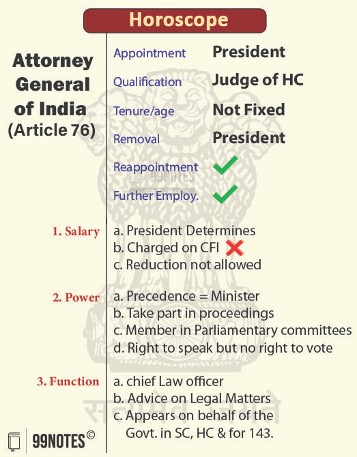
Restriction on the Attorney General of India:
Under Article 76 of the Constitution, the following Limitations of the attorney General of India have been enumerated:
- The Attorney General of India should not advise or give a brief in the cases where he has been invited to advise or appear before the Government of India.
- He should not hold a brief against the Government of India.
- In criminal prosecution, he should not defend the accused persons without the permission of the Government of India.
- Without the Government’s permission, he should not accept any appointment as a director in any corporation or company.
- He should not advise any ministry or department, any statutory organization, or any public sector undertakings without the reference of the law ministry. Still, if the union government finds it important to relax these provisions, then it can do so.
- He is not a full-time counsel for the Government of India and does not fall under the category of government servants.
Solicitor General of India:
The office of the Solicitor General is most crucial in handling the bulk of the centre’s litigation spread across the Country.
- Apart from the Attorney General of India, there are other law officers as well in the Government of India, such as;
- Solicitor General of India.
- Additional Solicitor General of India.
- He is the second most senior law officer after Attorney general.
- The office of the Solicitor General of India and Additional Solicitor General of India is not mentioned in the Constitution of India. Thus, the posts are merely In other words, the post was created by an act of Parliament, and the post may be abolished by an act of Parliament.
- Appointment: The President appoints him on the recommendation of the Appointment Committee of the Cabinet (ACC) chaired by the Prime Minister.
- Tenure: He is appointed for a term of 3 years, but he holds office at the pleasure of the President.
- Functions: Both of them help the Attorney General fulfil his official responsibilities.
- Resignation: He may quit his office by submitting his resignation to the President. He is eligible for reappointment after ceasing to hold office.
- The First solicitor general of India was C.K. Daphtary.

